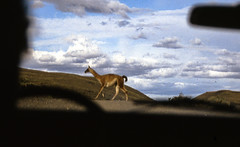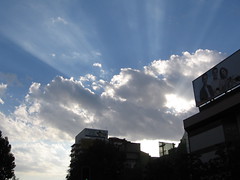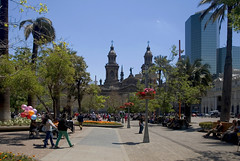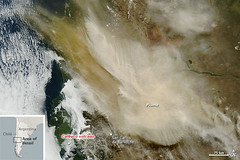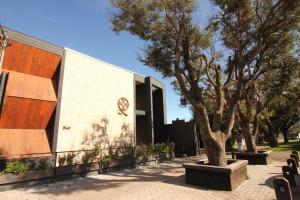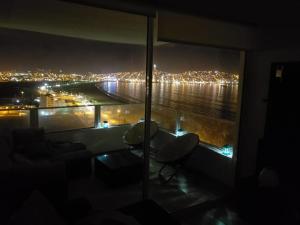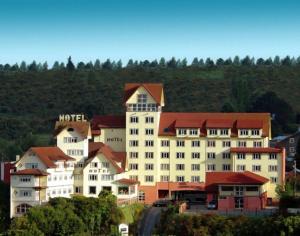 Chile
Chile
Chile, officially the Republic of Chile, is a country located in western South America. It is the southernmost country in the world and closest to Antarctica, stretching along a narrow strip of land between the Andes Mountains and the Pacific Ocean. With an area of and a population of 17.5 million as of 2017, Chile shares borders with Peru to the north, Bolivia to the northeast, Argentina to the east, and the Drake Passage to the south. The country also controls several Pacific islands, including Juan Fernández, Isla Salas y Gómez, Desventuradas, and Easter Island, and claims about of Antarctica as the Chilean Antarctic Territory. The capital and largest city of Chile is Santiago, and the national language is Spanish.
Spain conquered and colonized the region in the mid-16th century, replacing Inca rule, but failed to conquer the independent Mapuche people who inhabited what is now south-central Chile. In 1818, after declaring independence from Spain, Chile emerged as a relatively stable authoritarian republic in the 1830s. During the 19th century, Chile experienced significant economic and territorial growth, putting an end to Mapuche resistance in the 1880s and gaining its current northern territory in the War of the Pacific (1879–83) by defeating Peru and Bolivia. In the 20th century, up until the 1970s, Chile underwent a process of democratization and experienced rapid population growth and urbanization, while relying increasingly on exports from copper mining to support its economy. During the 1960s and 1970s, the country was marked by severe left-right political polarization and turmoil, which culminated in the 1973 Chilean coup d'état that overthrew Salvador Allende's democratically elected left-wing government. This was followed by a 16-year right-wing military dictatorship under Augusto Pinochet, which resulted in more than 3,000 deaths or disappearances. The regime ended in 1990, following a referendum in 1988, and was succeeded by a center-left coalition, which ruled until 2010.
Chile has a high-income economy and is one of the most economically and socially stable nations in South America, leading Latin America in competitiveness, per capita income, globalization, peace, and economic freedom. Chile also performs well in the region in terms of sustainability of the state and democratic development, and boasts the second lowest homicide rate in the Americas, following only Canada. Chile is a founding member of the United Nations, the Community of Latin American and Caribbean States (CELAC), and the Pacific Alliance, and joined the OECD in 2010.
Etymology
There are various theories about the origin of the word Chile. According to 17th-century Spanish chronicler Diego de Rosales, the Incas called the valley of the Aconcagua Chili by corruption of the name of a Picunche tribal chief called Tili, who ruled the area at the time of the Incan conquest in the 15th century. Another theory points to the similarity of the valley of the Aconcagua with that of the Casma Valley in Peru, where there was a town and valley named Chili.
Other theories say Chile may derive its name from a Native American word meaning either 'ends of the earth' or 'sea gulls'; from the Mapuche word , which may mean 'where the land ends'" or from the Quechua chiri, 'cold', or , meaning either 'snow' or "the deepest point of the Earth". Another origin attributed to chilli is the onomatopoeic —the Mapuche imitation of the warble of a bird locally known as trile.
The Spanish conquistadors heard about this name from the Incas, and the few survivors of Diego de Almagro's first Spanish expedition south from Peru in 1535–36 called themselves the "men of Chilli". Ultimately, Almagro is credited with the universalization of the name Chile, after naming the Mapocho valley as such. The older spelling "Chili" was in use in English until the early 20th century before switching to "Chile."
History
Early history
Stone tool evidence indicates humans sporadically frequented the Monte Verde valley area as long as 18,500 years ago. About 10,000 years ago, migrating Indigenous Peoples settled in fertile valleys and coastal areas of what is present-day Chile. Settlement sites from very early human habitation include Monte Verde, Cueva del Milodón and the Pali-Aike Crater's lava tube.
The Incas briefly extended their empire into what is now northern Chile, but the Mapuche (or Araucanians as they were known by the Spaniards) successfully resisted many attempts by the Inca Empire to subjugate them, despite their lack of state organization. They fought against the Sapa Inca Tupac Yupanqui and his army. The result of the bloody three-day confrontation known as the Battle of the Maule was that the Inca conquest of the territories of Chile ended at the Maule river.
Spanish colonization
In 1520, while attempting to circumnavigate the globe, Ferdinand Magellan discovered the southern passage now named after him (the Strait of Magellan) thus becoming the first European to set foot on what is now Chile. The next Europeans to reach Chile were Diego de Almagro and his band of Spanish conquistadors, who came from Peru in 1535 seeking gold. The Spanish encountered various cultures that supported themselves principally through slash-and-burn agriculture and hunting.
The conquest of Chile began in earnest in 1540 and was carried out by Pedro de Valdivia, one of Francisco Pizarro's lieutenants, who founded the city of Santiago on 12 February 1541. Although the Spanish did not find the extensive gold and silver they sought, they recognized the agricultural potential of Chile's central valley, and Chile became part of the Spanish Empire.
Conquest took place gradually, and the Europeans suffered repeated setbacks. A massive Mapuche insurrection that began in 1553 resulted in Valdivia's death and the destruction of many of the colony's principal settlements. Subsequent major insurrections took place in 1598 and in 1655. Each time the Mapuche and other native groups revolted, the southern border of the colony was driven northward. The abolition of slavery by the Spanish crown in 1683 was done in recognition that enslaving the Mapuche intensified resistance rather than cowing them into submission. Despite royal prohibitions, relations remained strained from continual colonialist interference.
Cut off to the north by desert, to the south by the Mapuche, to the east by the Andes Mountains, and to the west by the ocean, Chile became one of the most centralized, homogeneous colonies in Spanish America. Serving as a sort of frontier garrison, the colony found itself with the mission of forestalling encroachment by both the Mapuche and Spain's European enemies, especially the English and the Dutch. Buccaneers and pirates menaced the colony in addition to the Mapuche, as was shown by Sir Francis Drake's 1578 raid on Valparaíso, the colony's principal port. Chile hosted one of the largest standing armies in the Americas, making it one of the most militarized of the Spanish possessions, as well as a drain on the treasury of the Viceroyalty of Peru.
The first general census was conducted by the government of Agustín de Jáuregui between 1777 and 1778; it indicated that the population consisted of 259,646 inhabitants: 73.5% of European descent, 7.9% mestizos, 8.6% indigenous peoples and 9.8% blacks. Francisco Hurtado, Governor of the province of Chiloé, conducted a census in 1784 and found the population consisted of 26,703 inhabitants, 64.4% of whom were whites and 33.5% of whom were natives. The Diocese of Concepción conducted a census in areas south of the Maule river in 1812, but did not include the indigenous population or the inhabitants of the province of Chiloé. The population is estimated at 210,567, 86.1% of whom were Spanish or of European descent, 10% of whom were indigenous and 3.7% of whom were mestizos, blacks and mulattos.
A 2021 study by Baten and Llorca-Jaña shows that regions with a relatively high share of North European migrants developed faster in terms of numeracy, even if the overall number of migrants was small. This effect might be related to externalities: the surrounding population adopted a similar behavior as the small non-European immigrant group, and new schools were created. Ironically, there might have been positive spillover effects from the educational investment made by migrants, at the same time numeracy might have been reduced by the greater inequality in these regions. However, the positive effects of immigration were apparently stronger.
Independence and nation building
In 1808, Napoleon's enthronement of his brother Joseph as the Spanish King precipitated the drive by the colony for independence from Spain. A national junta in the name of Ferdinand – heir to the deposed king – was formed on 18 September 1810. The Government Junta of Chile proclaimed Chile an autonomous republic within the Spanish monarchy (in memory of this day, Chile celebrates its National Day on 18 September each year).
After these events, a movement for total independence, under the command of José Miguel Carrera (one of the most renowned patriots) and his two brothers Juan José and Luis Carrera, soon gained a wider following. Spanish attempts to re-impose arbitrary rule during what was called the Reconquista led to a prolonged struggle, including infighting from Bernardo O'Higgins, who challenged Carrera's leadership.
Intermittent warfare continued until 1817. With Carrera in prison in Argentina, O'Higgins and anti-Carrera cohort José de San Martín, hero of the Argentine War of Independence, led an army that crossed the Andes into Chile and defeated the royalists. On 12 February 1818, Chile was proclaimed an independent republic. The political revolt brought little social change, however, and 19th-century Chilean society preserved the essence of the stratified colonial social structure, which was greatly influenced by family politics and the Roman Catholic Church. A strong presidency eventually …
Hotels Chile
Looking for places related to Chile?
Those are other destinations to find places related to Chile:










